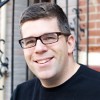Taylor Swift Has Boosted Small Business Sales Through Football Season
4 Work Apps to Try on the Apple Vision Pro Headset
The Biden Deep Fake Underscores the Risk Artificial Intelligence Poses in an Election Year
Powell Is Hearing Good Things From Small Businesses -- Which May Not Be Altogether Good for Rate Cut Hopefuls
10 Company Incubator and Accelerator Programs You Need to Know About
Etsy's Stock Price Jumps After an Activist Investor Joins the Board
Shopify's New AI Search Feature Helps Sellers Recommend the Right Products to Customers
In 2005, Steve Jobs gave the commencement address at Stanford University.
One point has stuck with me. It's about how you have to have faith that things will work out in life. Most of the time you can only see what's truly important -- "connect the dots," as Jobs put it -- in retrospect:
"[Y]ou can't connect the dots looking forward; you can only connect them looking backward. So you have to trust that the dots will somehow connect in your future."
Ironically, one of the best examples I've seen of this kind of dot-connecting in retrospect comes from the life of Mark Zuckerberg (and it's not the fact that he first introduced Facebook to the world 20 years ago today).
I think it's been hiding in plain sight for a long time, but even more ironically, Zuckerberg described the moment I'm thinking of in a commencement address of his own, addressing the graduates of Harvard University in 2017:
"How many of you remember exactly what you were doing when you got that email telling you that you got into Harvard?
I was playing Civilization and I ran downstairs, got my dad, and for some reason, his reaction was to video me opening the email.
That could have been a really sad video. I swear getting into Harvard is still the thing my parents are most proud of me for."
(Zuckerberg shared the video of that moment on Facebook. I'll embed the video at the end of this column.)
Now, here's my contention:.
It's not just that he now had a chance to study at arguably the most selective college in the United States. (Harvard had a 10 percent admission rate then; it's down to just 3.5 percent now!).
It's not even because Harvard was where he would meet his future wife, Priscilla, or because he would make friends who were rich enough to fund the first version of Facebook.
Instead, it's because the secret sauce of the early days of Facebook wasn't social media; it was Harvard. It only worked because it reflected an elite community, to the exclusion of everyone else who didn't go to Harvard.
I don't know if people remember this now, but in the earliest days, you had to be a Harvard student to join Facebook, using a harvard.edu email address. As word of the site spread, both via word-of-mouth on campus and as a result of articles in the (paper) Harvard Crimson student newspaper, demand grew fast--while the moat kept everyone else out.
Remember, MySpace had already been around for eight months before Facebook, and would remain the biggest social network for seveal years. Heck, Friendster head a head start, and seemed like it had a chance for a while.
But Facebook (originally, "TheFacebook"), was different because it was Harvard. In fact, as Zuckerberg's Harvard classmate Alexis C. Madrigal describes, the site was originally just an online version of the paper classmate directories, that were literally called "Facebooks," that were distributed to Harvard students:
TheFacebook borrowed some of the intimacy of the college environment ... So people at Harvard, and then elsewhere, started giving more and more of themselves to the web.
...
And so it went from school to school, establishing a new norm of how to be on the internet that was firmly enmeshed with how to be in college.
Within a few months Zuckerberg expanded Facebook to larger and larger circles--again, none of which would have been possible had he not been admitted to the innermost elite circle to begin with:
Anyway, back to Jobs. In his 2005 speech, Jobs said he realized that dropping out of Reed College and auditing a calligraphy class for free turned out to be one of the big "dots" in his life, because:
If I had never dropped in on that single course in college, the Mac would have never had multiple typefaces or proportionally spaced fonts.
And since Windows just copied the Mac, it's likely that no personal computer would have them.
For Zuckerberg, it's the opposite: Had he not been accepted at Harvard on December 14, 2001, it's likely that social media would have been very different.
Here's the video of what might well have been the most important moment in his life--but only when you can connect the dots looking backward.
Now accepting applications for Inc.’s Best Workplace awards. Apply by February 9 for your chance to be featured!
A refreshed look at leadership from the desk of CEO and chief content officer Stephanie Mehta
Privacy Policy





















 Toi Staff
Toi Staff Gideon Levy
Gideon Levy Belen Fernandez
Belen Fernandez Mort Laitner
Mort Laitner Rami G Khouri
Rami G Khouri Ali Fathollah-Nejad
Ali Fathollah-Nejad Nikkei Editorial
Nikkei Editorial
